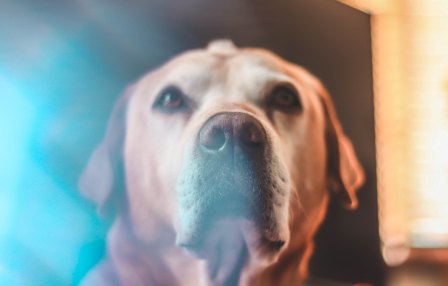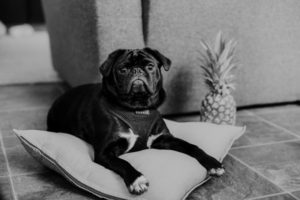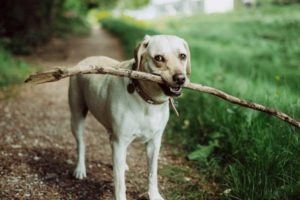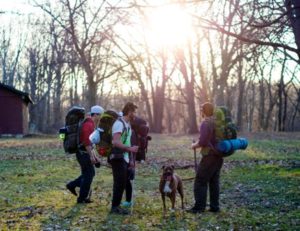The following article is written by Chris P. Janelli and he is the Executive Director, The Simon Foundation’s Center for Canine Behavior Studies (DrDodman.org).
This is a long post but worth reading. You will also get to know quite a few facts about Labrador Retrievers.
One of the genuine pleasures of my work with The Simon Foundation’s Center for Canine Behavior Studies is connecting with people around the world and discovering extraordinary individuals. No matter where in the world there are dogs, there are people who not only love them, but are giving of themselves, in both full-time professional careers and part-time volunteer work, to make the world a better, safer and more loving place for canines. I am inspired everyday by these people.
Infrequently, I connect with someone who doesn’t just inspire me but blows me away. One such person is my new found friend—Carolyne Linda Poulton, BEM—who is literally, so to speak, at the end of the earth; or at least a tiny part of it. On Google Earth go to the northern most part of Scotland and about 12 miles southwest from John O’Groats, the most northerly point of Scotland, and approximately half way between the towns of Wick and Thurso is a small village (last census population of 163) where you will discover the incredible Labrador Lady of Lyth. If you want to meet her, you best schedule an appointment because a lot of her daylight hours are spent walking—in both good weather and the howling gales of northern Scotland—her surrounding “sticks, sheep and horse” country with her beloved Labrador retrievers Emma and Pilgrim.
Carolyne Poulton is recognized around the world for her passion of re-homing Labradors, which she does as the Coordinator for the non-profit organization Labrador Retriever Rescue Scotland Scio, which she officially founded in 2011 after years of rescue and rehoming Labradors. Carolyne is an angel and heroine to more than 5,000 Labradors throughout Scotland and the U.K. who found new homes and owners when circumstances left them homeless. As Carolyne related to writer Bruce Sandison of the John O’Groat Journal, “The majority of cases are genuinely sad for the owners who, because of changed circumstances, have to give up their much-loved dogs – death of an owner, terminal illness, emigration, marriage/partnership break-ups.”
According to the Kennel Club (the U.K. equivalent of the American Kennel Club), “The Labrador is one of the best all-round dogs in the world. Not only used for retrieving game, he has also made his mark in the world of assistance dogs and as a ‘sniffer’ dog for drug and arms detection. They make good companions, their temperament making them ideal all-round family dogs.”
Like many of the most loved breeds, Labradors, which are one of the world’s most highly regarded gun dogs, are sometimes chosen not for their breed’s “working” characteristics and traits, but simply because they make good companions, their temperament making them superb family dogs; Labs are especially good with children. Unfortunately, the home environment many Labs find themselves in might not be what the Lab needs physically or characteristically.
Labs are intelligent animals bred for work at which they excel— retrieving, which sounds easy when many dogs of various breed and breed mixes love to “fetch” thrown objects for their owners. But a Lab trained as a gun dog does a whole lot more than just fetch. Not only are they trained to commands, they must have the patience to sit still quietly, watch the birds that are the game, mark a downed bird—often more than one—and wait for their command to go into action. While the dog may have seen where a downed bird fell or landed, often locating the bird is done by the sense of smell; especially when the bird is downed in thick cover, or if the bird has “run.” A particularly well trained retriever may know the difference between a clean kill and a wounded bird, and go for the latter first.
Many of the Labradors that Carolyne works with were typically not bred as urban and suburban home companions, but as field companions that work to the gun. But whether the Lab was bred to be sold as a family pet or for working as a gun dog retriever, they all share the same genetics and depending upon a particular dog’s expressed genetic characteristics, sometimes a Lab owner and their dog are not the right match.
It is not uncommon that a suburban or urban owner of a Labrador, as much as they might love the animal, will realize the error of their choice in choosing a relatively large strong active gun dog as their canine companion. If their dog is lucky, the owners may somehow find their way to Carolyne and her organization – Labrador Retriever Rescue Scotland Scio (LRRSS). Fortunately, Carolyne is somewhat of a legend in Labrador circles and thus find-able for anyone seeking help in re-homing their dog in an appropriate home environment. And Carolyne won’t re-home a dog unless she is absolutely convinced that the dog and the prospective owners are the right match, but it doesn’t stop there. Once Carolyne re-homes a dog, she is that dog’s guardian angel for life, staying in touch with the new owners and providing whatever support they need to give their Lab a forever home.
Carolyne’s dogs are the luckiest dogs in the world because the alternative for too many mismatched canines is abuse, cruelty or worse – abandonment leading to euthanasia. Carolyne has experienced her share of welfare and cruelty cases as well; she believes the welfare cases are mostly due to owner ignorance. If a situation is especially bad, Carolyne has established relationships with people that she can count on to help get the dog out of a cruel or potentially deadly situation. Sometimes a case can be particularly touchy with an owner who prefers euthanasia over the social stigma of word getting out that their dog had to be rescued from them. In many instances, Carolyne will be silently working behind the scene directing others in a quiet negotiation to convince an owner to relinquish their dog. “That’s the negotiation part of my job and I’m a Master of Arts at doing that,” she says with a laugh, but saving an animal is anything but a laughing matter for Carolyne.
The cruelty cases are more heartbreaking, more so because cruelty to man’s best friend says something not so pleasant about some of us humans. “I find the Labrador to be too forgiving,” says Carolyne adding, “they will tolerate much more than they should. Victims of their own success I suppose. Of course it depends on their personality, but in the main I’d say Labradors are much too forgiving of humans and their unfortunate circumstances.”
With Carolyne’s notoriety and reputation as a gun dog trainer, you would think she had been involved with dogs her entire life instead of just the past 16 years. Carolyne didn’t grow up in a house full of dogs or guns, but her parents loved animals and people and they passed that love on to their daughter. Carolyne’s great grandma was a horsewoman who rode sidesaddle and her great granddad was a gamekeeper who in his professional capacity knew his way around both guns and dogs. No doubt, whatever the genes are for loving the outdoors and being with dogs and horses were passed down to Carolyne who passed them on to her son Jamie (29) and daughter Suzie (27), both of whom love horses and dogs as well.
Carolyn’s initiation into and eventual full-time involvement in Lab rescue—something she says she never intended to do— resulted from adopting her first black Lab D’Arcy whose photo is the face of Labrador Retriever Rescue Scotland Scio.
As Carolyne describes it, “D’Arcy was the canine love of my life who began my love affair with Labrador retrievers. It’s all because of D’Arcy that LRRSS exists today. She had a bigger impact on my life than anything I suspect and took me on a journey, which would help thousands of Labradors. I bought her as a puppy at 5 weeks old; her mum had died, hence I took over hand rearing her at 5 weeks old. It’s really D’Arcy who should have received that medal, not me because without her so many wonderful things in my life wouldn’t have happened
D’Arcy was later joined by Emma who Carolyne calls her “chocolate girl” and after D’Arcy passed away, a male Lab Pilgrim joined the Poulton family.
In her journey to becoming one of the world’s leading Labrador rescuers, Carolyne attributes much of her success to the love and generosity of her father James Sinclair and lovely mum Christina, both of whom she misses dearly: “My mum and dad were such generous people, always so generous to my Rescue, especially if I was doing an appeal to save a Labrador’s life and they needed surgery, which was going to cost thousands. Mum and Dad were the first to put their hands in their pocket and give me a really good donation. If my parents saw a tramp or homeless person, they would quietly slip them a £5 note and tell them go get something to eat. They were the kindest most generous people on this earth and I miss them so much.”
Now training Labradors to be gun dogs is a lot different from rescuing and re-homing, and apparently a lot of Labradors go to Carolyne’s Greenland K9 training school because of her reputation as one of the best gun dog trainers. Carolyne’s love of gun dog training came from her realization that of all the disciplines in dog training, she had the passion for training gun dogs. She also had many close friends who shot mainly over Labradors, Flatcoats, Pointers, Springers and Cocker Spaniels.
Carolyne’s rescue work is so well known and respected throughout the United Kingdom and Scotland, that on 27th September 2014, on behalf of Her Majesty the Queen the Lord Lieutenant of Caithness awarded Carolyne for her work with Labrador retrievers with the British Empire Medal, also known as the Medal of the Order of the British Empire for Meritorious Service. Medal recipients are entitled to use the post-nominal letters “BEM,” which Carolyne’s daughter proudly proclaims stands for Best Ever Mum; and rightly so. Carolyne’s modest response to this honor was to say, “I was very humbled to receive this award and quite honestly shocked, because I found it hard to get my head round the fact that I was being rewarded and recognized for doing something which is my daily passion in life and has been for the last 16 years.”
The Investiture started with a speech by Lord Lieutenant Anne Dunnet to a large crowd of well wishers, and family members, some of whom had traveled from as far as London and Cambridge. Then it was Carolyne’s turn to speak. As Carolyne started, she had her black Labrador Pilgrim at her side, quite likely the first time in the history of the British Empire a dog ever participated in an Investiture for the British Empire Medal. What followed in Carolyne’s own words is this.
“Whilst all of this was happening, Pilgrim was just sitting a couple of feet away from me. So I started my speech off—all well rehearsed 5 pages of it—thanking everyone for coming. I then said if I could be granted 2 wishes, it would be that my mum and dad could have been here as they were my staunchest supporters and would have been so proud. My second wish would have been that my beautiful black girl D’Arcy was still alive because the Investiture wouldn’t have been happening if it weren’t for her. D’Arcy was the reason I do Rescue and have rehomed thousands of Labradors. At this point, I got really choked up and my eyes filled with tears as I struggled to continue. In a fast deteriorating emotional state, I automatically turned to my right and looked at Pilgrim, which was all it took. Sensing my distress (and right on queue if this had been rehearsed) Pilgrim just stepped towards me; I bent down to his level and he licked my face! There was a group gasp and a few tears from many people there. I stayed down at Pilgrim’s level and he extended his right foreleg and actually put his paw in my right hand. We remained paw in hand for the duration of my speech with Pilgrim’s paw in my right hand and my five pages in left hand. I’m in no doubt that he, sensing my momentary emotional stress knew it was his job to recover me. And he did, giving me when most needed all of the right canine calming signals. Nothing before or after has ever demonstrated so significantly the loving and enduring bond that humans and canines can share.”
In her acceptance speech, the Labrador Lady of Lyth gratefully and graciously accepted the award not just for herself, but on behalf of all Rescuers.
At about the same time the Queen was recognizing Carolyne, an even more humbling (my word) Investiture took place in the great state of Texas, one of America’s premier water fowling regions. Mr. Randy Farrow, a Harley-riding duck hunter with four Texan Labradors—all of whom share Randy’s sofa after a hard hunt—awarded Carolyne with the title First Lady of Labrador Retrievers in Texas. “That title means so much to me,” said Carolyne adding, “I have a lovely framed photo of Randy’s four working Labradors with the award printed on it. These four Texan Labradors are wonderful Ambassadors for me and the frame sits proudly in my house on display. That meant more to me than if I’d won the lottery. I have always found the Americans to be such friendly helpful people, so I have a bit of a soft spot for the USA.”
Carolyne readily admits that her work and success is also the result of the support she receives from her associates at Labrador Retriever Rescue Scotland and her friends, but especially from her coterie of veterinary surgeons, which she says is the one profession that has had the most impact on her life. “So many of them all over Scotland and some in England have and continue to do so much for me in Rescue. They are the people who educated me the most about dogs. Not only that, but they help me the most in my Rescue. So from vet practices and surgeons, such as Vets Now Glasgow and Specialist surgeon Richard Coe, to vet hospitals like the Royal (Dick) School of Veterinary Studies in Edinburgh and the University of Glasgow Veterinary School and Small Animal Hospital—where Dr. Nicholas Dodman, the Center for Canine Behavior Studies’ Chief Scientific Officer worked as a young veterinarian—all help me with discounts and advice, and much more. I can never repay their kindness and thoughtfulness.
In addition to veterinary surgeons, one of the people that Carolyne most admires and respects is Dr. Dodman’s fellow vet school alumnus, the renowned and wonderful chronicler of pre and post WW-II veterinary practice in the Yorkshire Dales, Dr. James Alfred “Alf” Wight, OBE, FRCVS (3 October 1916 – 23 February 1995) who wrote under the world-recognized pen name of James Herriot. Like almost everyone who loves animals big and small, Carolyne has read all his books and said she recently re-read The Real James Herriot: A Memoir of My Father by his son James Wight recommending it as “A really good read.” Dr. Dodman knew Alf and at his son’s request wrote a byline for the autobiography.
Bachelor dogs should be warned that Carolyne is also the happily married Mrs. Peter Poulton, albeit he’s an Englishman (if you get my drift). In fact, when Carolyne introduced him to her parents, just for fun she said, “Well this is Peter, but I’m afraid he’s English” to which her mum replied without missing a beat, “Well, we all have our cross to bear.” No doubt, the fact that Peter was a Yorkshire Englishman made all the difference to Carolyne. Even more surprising, it was at Peter’s insistence to have a dog that caused Carolyne, who never wanted one, to cave in and take in D’Arcy. Before she knew what had happened, “I fell for her hook, line and sinker . . . . and before I knew it I was re-homing Labradors without even realizing it.” And that is the perfect example of how a companion dog can dramatically change a human’s life.
Labrador rescue is a 6 day a week mission for Carolyne with Sunday for gun dog training at her Greenland K9 training. Puppy training is 10am to 11am and then the gun dog training starts and ends in darkness, which can come pretty early in Lyth, Scotland. On December 21st, the winter solstice, sunrise in Salisbury, CT, USA where I live will be at 7:14am with sunset at 4:23pm; in Lyth, Scotland, U.K. the sunrise will be at 9:00am and sunset at 3:20pm. Perhaps one advantage is that the cocktail hour starts earlier in Lyth.
When time permits, Carolyne does public speaking to schools and groups interested in hearing about her work. She even taught a Labrador British Sign Language and gave a demo with a hearing Labrador to a group of school kids who loved it.
Carolyne’s heart isn’t just in the dogs, but in the people who own them. Dad and mum taught Carolyne well, or perhaps it’s those family genes, that put people ahead of money. If there are people with dogs who can’t afford the training, then Carolyne doesn’t charge them a single groat; “I’m not out to make money, I just like to see dogs being obedient and having fun. If someone feels they have to give up their Labrador and I know they love the dog and it’s just down to some training and minor behavioral stuff I’ll do that for free.” But Carolyne’s generosity doesn’t stop there. For her, preventing rehomings is just as rewarding as rehoming and she also provides this service by phone and emails to people anywhere in the country for free.
Now after learning about the Labrador Lady of Lyth, Mrs. Carolyne Poulton, BEM, and all of her wonderful work in Scotland and throughout the U.K. saving and training Labradors, you probably think that is the reason why the Center for Canine Behavior Studies decided to make her one of our Heroines. It isn’t. In fact, when I first connected with Carolyne via LinkedIn I had no idea of who she was other than being a coordinator for a Labrador rescue organization in Scotland.
Because the Center is recruiting dog owners the world over to register to voluntarily participate in Drs. Dodman and Serpell’s Animal Ownership Interaction Study, I simply asked Carolyne if she had any thoughts about how to spread the word throughout Scotland. Her response is what blew me away. Here is what she said.
“I am more than happy to help the Center and both Dr. Dodman and Dr. Serpell in any way I can . . . I feel my job is not only rescuing and the rehabilitation of Labradors, but also educating the public. I
do it daily albeit about health of dogs, feeding, training and behavior, though I’m not a behaviorist, just a gun dog trainer. However, I feel Labradors teach me so much about dogs on a day-to-day basis. I am on a constant learning curve about dogs and I’m always keen to learn more as apart from being interesting it has the result of helping dogs. So I will do whatever I can to help you all . . . . I have my own personal Facebook page with over 5000 friends on it (a few Americans too) and also the Labrador Retriever Rescue Scotland page, which has over 67,000 followers . . . . We can use that too for the lovely vet who is doing such good work; we will get the word out there . . . . Before we even get to know each other, I just know we sing from the same hymn sheet and we are just about helping the animals. Let me know your thoughts on ways I can help.”
Carolyne’s reply to a simple question from someone she didn’t know, but who asked for help blew me away. Her pure and immediate generosity was more than enough for me to know I had connected with someone special, but after learning more about who she is, what she has achieved following her passion for Labs, and what she does for dogs and people, I knew I was in the presence of “the real deal.”
And now so apparently typical of Carolyne and her life loyalty to the canine love of her life, she passes on the credit for our connecting saying, “I am in no doubt that it is because of D’Arcy that you and I know each other now.”
Carolyne Linda Poulton, BEM, it is with awe and great admiration that on behalf of The Simon Foundation I declare you a Heroine of the Center for Canine Behavior Studies.
Photo by Parker Johnson on Unsplash
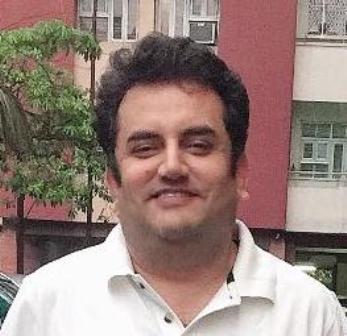
I am a dog lover and creator of this site. I am also the author of ‘Keep Sleeping Keep Missing- if only you knew’ (available on Amazon, Flipkart, Kobo, Google Store, etc.).

